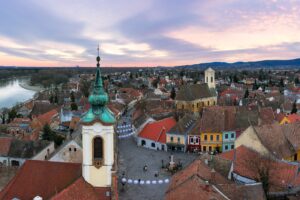Natalia’s story is definitely an unusual one. She was born in Northern Russia, then studied in St. Petersburg, the US, and Budapest. After her one-year scholarship had expired, she decided to stay in the city. Natalia did not only find a job, but true love as well, and has since become married to him.
Why did you choose CEU?
After getting my BA degree I started working in St. Petersburg, but I didn’t find much joy in my job. One of my former professors told me to try my luck and aim for CEU’s scholarship program. I followed his advice, and after a Skype interview and a couple of tests I’ve received a year-long scholarship.
What did you know about Budapest before arriving here?
Barely anything. I thought Budapest and Bucharest is the same city!
Even though Russian and Hungarian history is linked to each other in several ways…
Do you know how many countries Russia is and was in close contact with? Many Russian people know about „Kubik Rubik” (Ernő Robik, the inventor of Rubik’s Cube) and Russians love Tokaji wine, however.
What was your first impression of Budapest?
That it’s dirty. Before we occupied our student accommodation, my friend and I decided to go for a little shopping at IKEA. From there, we took a bus ride back to our place, but because we didn’t know that you have to signal to the driver that you want to get off, we could only descend the bus later on, and in the meantime almost half of our stuff was stolen. Eventually we hailed a taxi cab to go home, and the driver ripped us off with a lot of money.
I hope that your impression had changed for the better since then.
I didn’t really have time to sightsee in the first six months. I had to study a lot, and all I did was commute between my accomodation and the university.
Did you enjoy the university?
It took me by surprise that all of my teachers were Hungarian. The university’s educational method was similar to the American approach, CEU is an open, tolerant institution.
How was your American university experience?
I studied Bard College, school of liberal arts and sciences for almost a year. One thing I can tell you is that the students were really free-spirited. I remember, there was this guy who dressed up as a girl every Friday, and behaved like one, too. It was completely natural, though, everybody accepted him.
Since you’re still living in Budapest, you must have eventually fallen in love with the city. When did that happen?
In the beginning, when I was taking long walks around the Chain Bridge and Erzsébet Bridge, the city reminded me of St. Petersburg. It was together with my husband, Marci, that I started to discover the many treasures of Budapest.
How did you two meet?
I was looking on Google for people who wanted to learn Russian and in exchange could teach me Hungarian. That’s how I found Marci. Then as we got to know each other more and more, I asked him for a meetup. Events quickly followed one another, and now we’re married.
I noticed during the interview that even when speaking English, you use a lot of Hungarian words. It seems like you completely mastered the language.
I misuse words constantly. Once, when I was telling everybody how the dentist found 9 dental cavities in my mouth, they all burst into laughter. I suddenly realized that I pronounced „lyuk” (cavity) wrong, and to them it sounded like the dentist had found 9 hens (tyúk) in my mouth.
What’s your one Budapest experience that you won’t ever forget?
The celebrations on 20 August a couple of years ago. I loved the taste of the Cake of Hungary and the fireworks at night. That’s when the realization hit me, that Russians and Hungarians are very similar in one way: both people are very proud of their nation.




